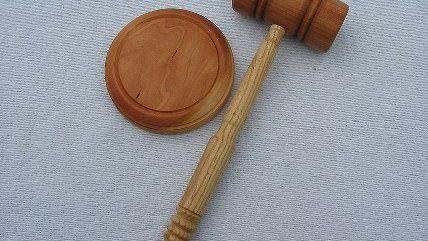Phony Baloney FISA Court Makes Resistance to Surveillance Requests a Futile Effort


As I noted a few days ago, it's hard to tell just how complicit tech companies and telecoms are in government snooping, because of the veil of secrecy behind which the hoovering of data stored by the likes of Google and Facebook is conducted. Are companies resisting? Are they folding? We have only hints and anecdotes to go on. We do know, however, that the Foreign Intelligence Surveillance Court has a history of rubber-stamping snooping requests, which might put a damper on any rebellious spirits who aren't even allowed to advertise their dismay. Now, using data compiled by the Electronic Privacy Information Center as well as tales extracted from several unnamed (for good reason) sources, the New York Times tells us just how bad the situation is.
From Claire Caine Miller at the New York Times:
SAN FRANCISCO — In a secret court in Washington, Yahoo's top lawyers made their case. The government had sought help in spying on certain foreign users, without a warrant, and Yahoo had refused, saying the broad requests were unconstitutional.
The judges disagreed. That left Yahoo two choices: Hand over the data or break the law.
So Yahoo became part of the National Security Agency's secret Internet surveillance program, Prism, according to leaked N.S.A. documents, as did seven other Internet companies.
Like almost all the actions of the secret court, which operates under the Foreign Intelligence Surveillance Act, the details of its disagreement with Yahoo were never made public beyond a heavily redacted court order, one of the few public documents ever to emerge from the court. The name of the company had not been revealed until now. Yahoo's involvement was confirmed by two people with knowledge of the proceedings. Yahoo declined to comment.
But the decision has had lasting repercussions for the dozens of companies that store troves of their users' personal information and receive these national security requests — it puts them on notice that they need not even try to test their legality. And despite the murky details, the case offers a glimpse of the push and pull among tech companies and the intelligence and law enforcement agencies that try to tap into the reams of personal data stored on their servers.
Famously, the Foreign Intelligence Surveillance Court approved all but one of the 1,856 surveillance requests it received in 2012. According to EPIC, in most years, the FISC has denied none of the surveillance requests placed before it. In some years, the court somehow manages to approve more surveillance applications than it officially receives. As a result, says the Times, companies looking to resist the most intrusive demands "rarely fight in court, but frequently push back privately by negotiating with the government, even if they ultimately have to comply."
The Times quotes sources, including Christopher Soghoian of the ACLU, attributing a "libertarian, pro-civil liberties vein" to many people in the tech industry, but at its best, that leaves demoralized business people with little chance of prevailing and no opportunity to appeal to public opinion as the only line of defense between nosy government officials and targeted customers. The customers themselves, with an obvious interest in their own privacy, are not given the opportunity to defend themselves or even notice that they need defense.
As for those who find some comfort in the idea that something called a "court" is at least perusing these surveillance requests, keep in mind that the FISC operates at a lower standard of scrutiny than, say, a real court. Notes EPIC:
Under the Fourth Amendment, a search warrant must be based on probable cause to believe that a crime has been or is being committed. This is not the general rule under FISA: surveillance under FISA is permitted based on a finding of probable cause that the surveillance target is a foreign power or an agent of a foreign power, irrespective of whether the target is suspected of engaging in criminal activity. However, if the target is a "U.S. person," there must be probable cause to believe that the U.S. person's activities may involve espionage or other similar conduct in violation of the criminal statutes of the United States.
But, if a "U.S. person" is conversing with somebody oversees?
And the court still deliberates, and issues its decisions, in secret.
Editor's Note: As of February 29, 2024, commenting privileges on reason.com posts are limited to Reason Plus subscribers. Past commenters are grandfathered in for a temporary period. Subscribe here to preserve your ability to comment. Your Reason Plus subscription also gives you an ad-free version of reason.com, along with full access to the digital edition and archives of Reason magazine. We request that comments be civil and on-topic. We do not moderate or assume any responsibility for comments, which are owned by the readers who post them. Comments do not represent the views of reason.com or Reason Foundation. We reserve the right to delete any comment and ban commenters for any reason at any time. Comments may only be edited within 5 minutes of posting. Report abuses.
Please to post comments


Can we please stop hearing about "oversight". When the judge only rules one way and the government is free to go find another judge on the rare occasion he might not, there is no oversight.
Some fucking bootlicker on talk radio was talking about how the fact that none of the FISA requests were rejected proves that our stalwart agents of national security were only going after real threats.
Wow. That number is incredibly problematic. 1855 to 1 is not oversight. And further, when FISA was passed and or reauthorized, if anyone had said that the court would approve requests at that rate, the act would have never been passed. It makes the entire system a joke.
At this point fuck them. They clearly do not have the integrity and self control necessary to handle this kind of power and thus must be relieved of it.
At this point fuck them. They clearly do not have the integrity and self control necessary to handle this kind of power and thus must be relieved of it.
The POWER should be removed. Removing the current wielders of the power will do nothing.
That is what I meant.
No one has the integrity and self control necessary to handle this kind of power, John.
Exactly. If I were given that power, I'd probably wield it over the people that have been destroying liberty over the last few decades. Ironic, but why not?
Oh, absolutely, I know I would abuse it as well. You can't help it. At least like you I would use it to crush those who would oppress us, thereby becoming an oppressor myself! Yay!
Is investigating and trying people for crimes unlibertarian now?
If I was given dictatorial power, the first thing I'd do would be to open investigations into every single government agency and department.
Is investigating and trying people for crimes unlibertarian now?
Oh, nothing like that. Let's just say that every controlling politician and bureaucrat would suddenly find their online porn habits presented in a searchable directory free to the public.
Oops, hit submit too soon...
Jail is too good for those people. They'd get to be surrounded by fellow meddling degenerates in there. No, I'd publicly ruin them and let them live in shame among free people.
Oops, hit submit too soon...
Jail is too good for those people. They'd get to be surrounded by fellow meddling degenerates in there. No, I'd publicly ruin them and let them live in shame among free people.
It's like when the 16th Amendment was passed, someone proposed locking in a maximum tax rate of 4%. But others were concerned that Congress would immediately set the rate at 4%.
We'd get better oversight with a Magic 8-ball.
DEMOCRACY
/Tony
Normally, still protected, as are foreigners in the US, or US persons abroad. However, the key things to realize (to understand when guys like Clapper are misleading people):
1) Due to a long chain of slippery slope reasoning (starting with the fact that if you intercept wireless communications overseas, you can't know if there are US persons talking until you actually take a look at the metadata or content), the intelligence community largely operates on a "collect it all, then we'll figure out within a short time period which communication is that of a US person and throw that stuff away (minimization) unless we have a warrant / probable cause."
2) What's being alleged here includes that the NSA and others are getting the probable cause only through the intercepts that they're supposed to be throwing away. They're getting a general warrant, then throwing the stuff away *unless* they find stuff through the metadata in the traffic captured that then gives them probable cause. But that turns the notion of probable cause on its head.
3) The intelligence community only refers to something as a "collect" or "collection" after it's been through the minimization procedures, contrary to normal logic and use of the English language. "It depends on what the meaning of collect is."
I suddenly have a newfound respect for Yahoo. They might have bent the knee, but at least they offered some resistance.
Tech companies freely hand over information.....for a price, of course.
http://www.bloomberg.com/news/.....firms.html
I can confirm that various US software companies inform the government weeks before they release patches for vulnerabilities.
Under the Fourth Amendment, a search warrant must be based on probable cause to believe that a crime has been or is being committed.
So? The 4th amendment does not require a warrant for a search.
Sure. Because the people who wrote it were not already rooted in English Common Law - in which a warrant is required for any search.
Not to change the subject, but please sign this White House petition to pardon Edward Snowden:
http://tinyurl.com/or7ewxo
I'll wait until someone can convince me that online petitions are not completely worthless.
They're not worthless to Obama... he gets your email address and a sense of your political views for his opposition research. 😉